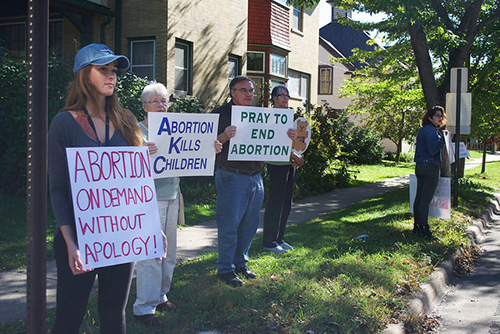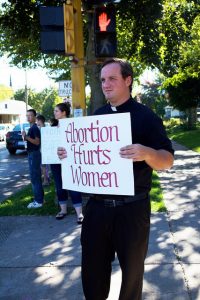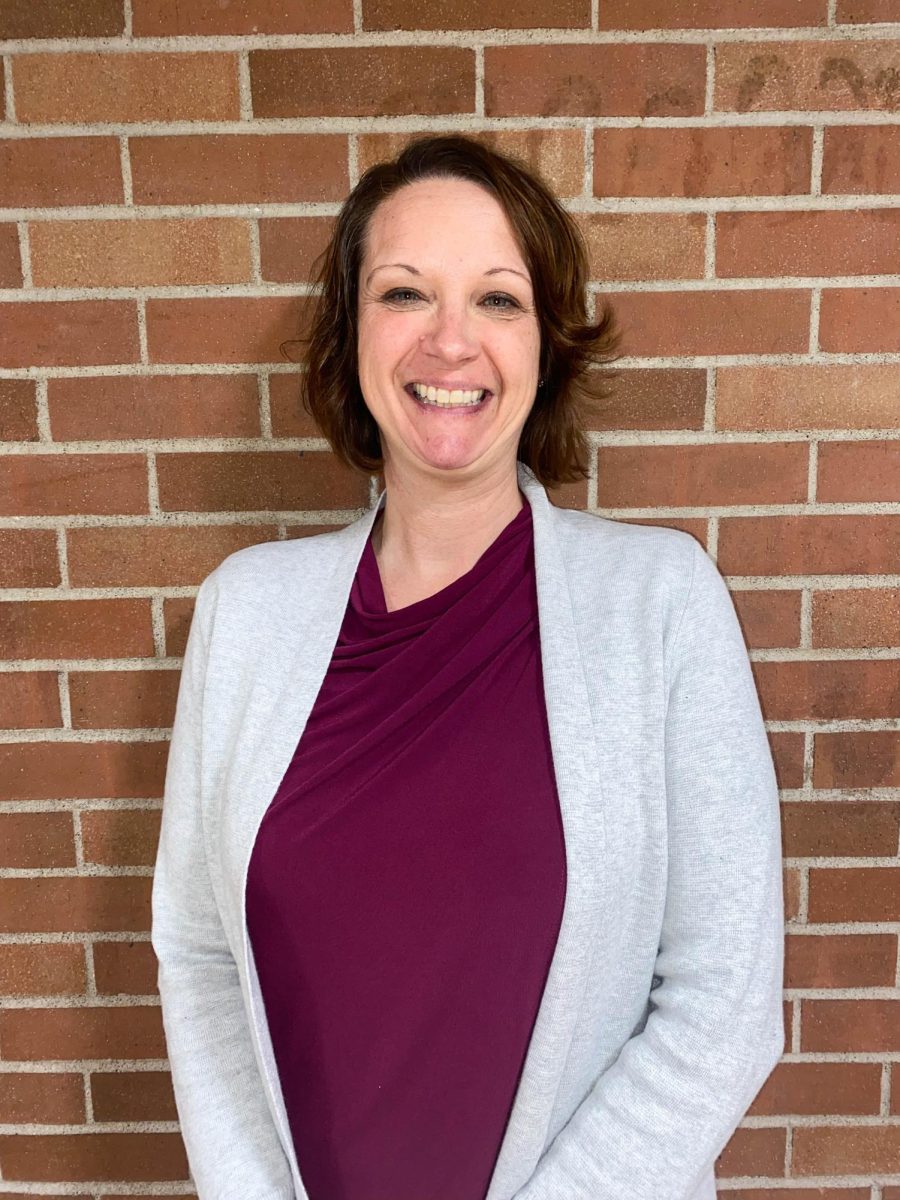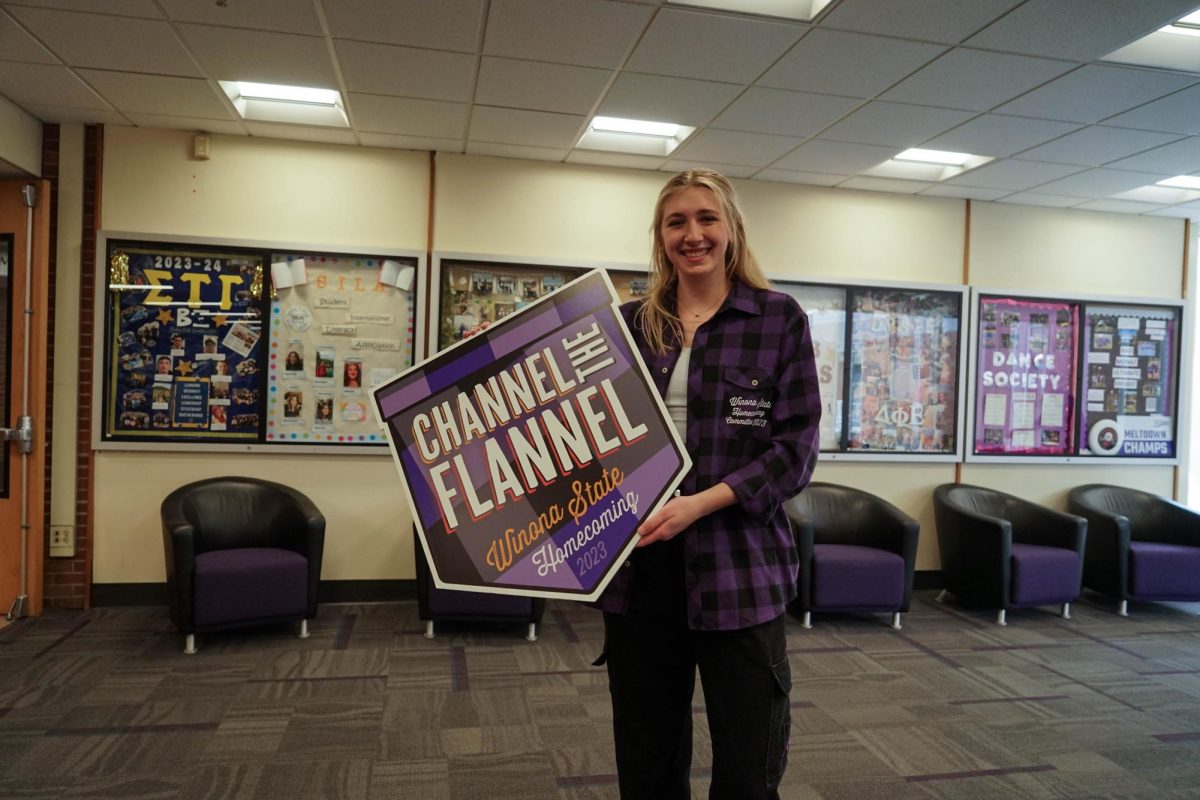
Sara Tiradossi / Winonan
With handwritten and colored posters that read “Health care for women now” on one side of the street and other protesters with signs that read “abortion kills women” on the other side, both pro-choice and pro-life supporters gathered Sunday, Oct. 2 to express their beliefs on the issue of abortion.
For some, Sunday’s event was considered a protest of women’s rights; for others it was an hour of prayer and solidarity for an end to abortion.
Winona State University professor of women’s, gender and sexuality studies Mary Jo Klinker said she attended the event because she thinks it is really great to see groups of students invested in feminist politics and speak out to support other women and their access to reproductive health care.
“What I enjoyed is that I got to talk to students why, for young women, it’s important to acknowledge that reproductive health care is still something that is constantly being critiqued of young women,” Klinker said.
President of Winona State’s Fighting for Our Rights and Gender Equality, or FORGE, Sarah Ortega said the club is a feminist club on campus that does a lot of different activist work around the community. On Sunday, the members of the club showed their involvement with pro-choice signs saying, “Honk for choice” or “Abortion on demand without apology.”
“It was very peaceful protest. The event was inspiring and it was nice to have support from the cars driving by,” Ortega said. “It’s nice to see the community reaching out to us in that way.”
Ortega said the club also collaborates with other groups like the KEAP Diversity Resource Center on campus.
Ortega said one thing the club is focusing on this year is changing the rape culture on campus and working with survivors of sexual assaults and gender-based violence to change the culture.
“Unfortunately, victim blaming is still deeply ingrained in our society and very relevant on campus now. We want to change that culture with the student body,” Ortega said.
Klinker added that student activism needs to be primary to faculty.
“These were a group of women holding signs that said, ‘abortion is a health care right,’ versus a largely aging and child demographic of people holding signs that said ‘abortion kills children,’” Klinker said. “What I’m really proud of is that
students made this a safe community to say that we are here to support women and their health care access right now.”
Klinker added that she is a firm believer in reproductive justice, which means having access to comprehensive health care, sex education and complete sovereignty over one’s body while living in a community that supports all mothers in a safe community as well.
“Reproductive justice is way more than abortion, we are talking about human rights. Access to clean food and clean water would be a reproductive issue, access to safe jobs, where can we raise our kids, safe schools,” Klinker said. “I don’t think that we live in that world right now.”
According to the Guttmacher Institute, 59 percent of women who have had abortions in 2014 were women who had already had at least one child. Klinker said the statistic changes the dynamics of who is being discussed and the decisions people make.
Another statistic by the institute said 75 percent of U.S. abortion patients are poor or [of] low income. Klinker said this means society must acknowledging that making decisions about when a woman is ready to be a mother has a lot to do with whether or not she has the ability to financially have a child.
While some were protesting women’s rights, others gathered on Sunday to show their solidarity toward the sanctity of human life.
Sunday marked the 29th anniversary of the National Life Chain, a network of pro-life groups and coordinators through the U.S. and Canada. The day is also considered “respect life Sunday” and October is considered “respect life month.”
Local National Life Chain coordinator Kathy Foerster said it was a chance to change hearts and minds and acknowledge the most vulnerable in society: the pre-born.
Pro-lifers in more than 1,500 cities across the country and Canada got together to pray for an end to abortion and to witness to the over 56 million lives lost to abortion, Foerster said.

“It’s a moving experience because everyone is focused on the same goal, the hour of prayer, and everyone is together for a common cause. Hopefully people driving by notice us and reflect on the vulnerability of unborn babies,” Forester said. “Children are our greatest resource and we need to protect our most vulnerable resource among us.”
Foerster said everyone has different points of views, but people do not have the right to end a human life.
“It is important to speak the truth, be respectful and examine why human life is so precious. It’s going to take a while to change the heart and mind of people and action, to come to a deeper understanding,” Foerster said.
Father Jonathan Fasnacht of Winona’s Newman Center was standing at the event with a poster that read, “Abortion hurts women.”
He said it is not easy for people to stand up for what they believe in, so he was proud of those who came and were willing to stay and pray.
“I was moved and thankful to see all these different people willing to come from all different churches, not only Catholic,” Fasnacht said. “It’s very important to get together as a community because we gain strength by coming together.”
Fasnacht said the women who feel pressured into having abortions are women who need support, help and love.
When thinking about the people on the other side of the spectrum, Fasnacht said he would like to approach them and offer them a dialogue about abortion and whether it is moral or not, in a friendly manner.
However, Fasnacht said he is glad pro-choice believers had the courage to stand up and protest them.
“They were doing something difficult. In some ways, it’s better to get it wrong and stand up than passively sit back without taking action about something that is so important. They were courageous,” Fasnacht said.
Much like Klinker, Fasnacht believes it all comes down to a human rights issue. Pro-choice supporters are fighting for the human rights of women and pro-life supporters are fighting for the human rights of unborn babies and women who they feel are pressured to do something.
“As time goes on, my hope is that it will become
more and more difficult for people to hold on to this untruth and falsity and come to know the truth that a child in the womb is a real person,” Fasnacht said.
Fasnacht said this cultural change is happening, as more young people are recognizing the truth, and asks people to ask themselves if it is not a baby in the womb, then when does it become a person.
“We are people because we have the ability to reason, we have high dignity and free will and decide for ourselves. That is something we are born with, but when we were babies, we didn’t have the same use of the gift of reason as we do when we grow up,” Fasnachat said. “I don’t think people get that far because they don’t want to be convinced of the truth.”
-By Sara Tiradossi





























































